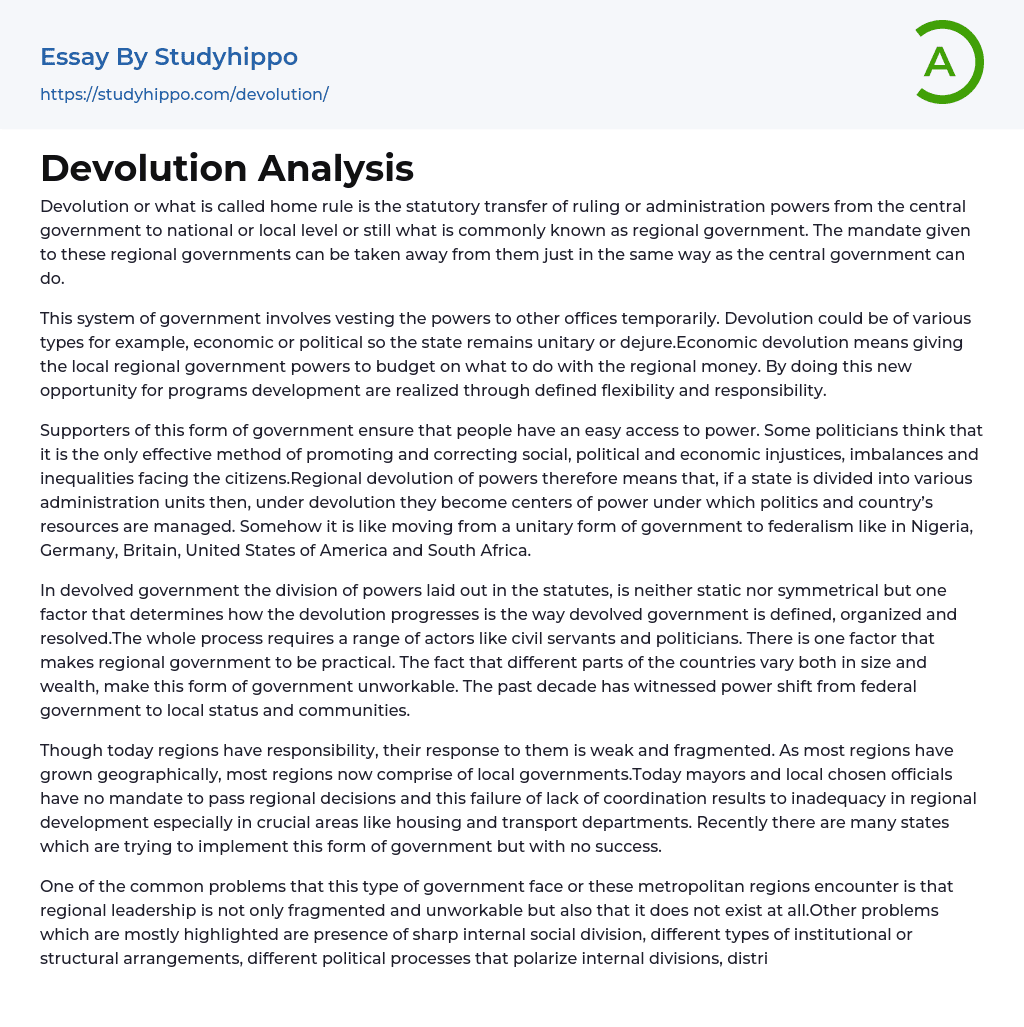The transfer of ruling or administration powers from the central government to regional government, also known as devolution or home rule, involves temporarily vesting powers to other offices. Devolution can be of different types, such as economic or political, and aims to maintain a unitary state. In economic devolution, the regional government is given power to manage regional funds and decide on budget allocation. This allows for the development of new programs with increased flexibility and responsibility. Supporters argue that devolution provides easier access to power for the people.
Regional devolution is seen by some politicians as the most effective way to address social, political, and economic injustices and inequalities faced by citizens. This approach involves dividing a state into different administration units, granting them power to manage politics and resources. This concept is
...similar to federalism in countries like Nigeria, Germany, Britain, United States of America, and South Africa. However, the distribution of powers in devolved government is not fixed or equal; it depends on how the government is defined, organized, and resolved. Civil servants and politicians play a crucial role in this process. The practicality of implementing regional government is influenced by various factors.
The reason why this type of government is not effective is because different parts of the country vary in size and wealth. In recent years, power has shifted from the federal government to local communities and statuses. However, these regions have a weak and fragmented response. Many regions now have local governments, but mayors and local officials do not have the authority to make decisions on a regional level. This lack of coordination leads to problems in important areas like housing
and transportation. Despite attempts by many states to adopt this form of government, they have not been successful. One common issue faced by metropolitan regions is fragmented or nonexistent regional leadership. Other problems include social divisions within regions, differences in institutional or structural arrangements, political processes that create divisions, and how resources are distributed and managed (Mark O.).
According to et al, p 53, regions with resources will demand greater autonomy in order to benefit from them, while regions without these resources will insist on centralization for equal distribution. Therefore, resources can be viewed as both a blessing and a curse when it comes to regional devolution. Regional governance functions better in areas with diverse populations compared to those dominated by one or a few groups. In situations where there are multiple groups, conflicts between the central government and regional units are less likely. However, when there is one dominant group, the likelihood of them relinquishing power to smaller ones is very low. Failed attempts at this form of government can be seen in states such as Czechoslovakia, Malaysia, and Yugoslavia. Federalism is also more effective when factors such as region, language, religion, and social classes do not overlap or cross-cut.
This is because people will once again feel united and connected under this form of government, which works well when there are no external influences. However, if targeted external pressures are faced by a certain group, it can hinder the government's efforts to achieve stability.
- Agriculture essays
- Albert einstein essays
- Animals essays
- Archaeology essays
- Bear essays
- Biology essays
- Birds essays
- Butterfly essays
- Cat essays
- Charles Darwin essays
- Chemistry essays
- Dinosaur essays
- Discovery essays
- Dolphin essays
- Elephant essays
- Eli Whitney essays
- Environmental Science essays
- Evolution essays
- Fish essays
- Genetics essays
- Horse essays
- Human Evolution essays
- Isaac Newton essays
- Journal essays
- Linguistics essays
- Lion essays
- Logic essays
- Mars essays
- Methodology essays
- Mineralogy essays
- Monkey essays
- Moon essays
- Mythology essays
- Noam Chomsky essays
- Physics essays
- Plate Tectonics essays
- Progress essays
- Reaction Rate essays
- Roman Numerals essays
- Scientific essays
- Scientific Method essays
- Scientist essays
- Seismology essays
- Space Exploration essays
- Stars essays
- Sun essays
- Thomas Edison essays
- Tiger essays
- Time Travel essays
- Universe essays




